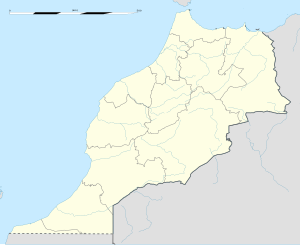Nador
Nador
|
|
|---|---|
| City | |
| Location in Morocco | |
| Coordinates: 35°10′N 2°56′W / 35.167°N 2.933°W | |
| Country |
|
| Region | Oriental |
| Province | Nador |
| Government | |
| Elevation | 138 ft (42 m) |
| Population (2014) | |
| • City | 161,726 |
| • Metro | approx. 250,000 |
| • Ethnicities | Berbers: 98%; Spaniards: 1%; Other foreigners: 1% |
| Time zone | WET (UTC+0) |
| • Summer (DST) | WEST (UTC+1) |
Nador (Berber: Ennaḍor, ⵏⵏⴰⴹⵓⵔ; Arabic: الناظور) is a coastal city and provincial capital in the northeastern Rif region of Morocco with a population of about 161,726 (2014 census). It is separated from the Mediterranean Sea by a salt lagoon named Sebkha Bou Areq (Arabic), Bḥar Ameẓẓyan (Berber) or Mar Chica (Spanish) and is 10 kilometres (6.2 mi) south of the Spanish city of Melilla. Nador was founded in the 19th century and was under Spanish colonial rule until Morocco’s independence in 1956.Nador Province has over 600,000 inhabitants, predominantly of Riff-Berber ethnicity.
The origin of the city name is disputed. It may have originated from Has Nador, which was a small village by the lagoon, or it may have come from Arabic terms meaning either lighthouse or sight.
The economy of Nador and Nador province includes fishery, agriculture, some light and heavy industry. The economy has grown dramatically in recent years, particularly due to the manufacturing sector with the building of a metal processing complex supplied with iron ore from Wiksan, a mountain in the Rif range, anthracite from Jerada, textiles, chemicals and some electronics industries.
In the summer months of June to August thousands of people originating from the Nador area and living in Europe return to the city. The total of these annual visitors may exceed 250,000. They mainly stay with relatives or in rented or owned apartments, rather than staying in Nador's hotels.
The location of the city on the Mediterranean coast and proximity of the Spanish town Melilla mean there is significant international trade, particularly evident in the widespread sale of Spanish manufactured foodstuffs and household goods in Nador.
Nador was infamous as a centre of smuggling cheap Spanish and Chinese duty-free goods. Currently the smuggling has declined but it still alive competing with a smuggling stream from Algeria. Many used consumer goods from Europe and China find their way to Morocco and Africa via Melilla and Nador, both legally and illegally. The goods range from conserved food, clothes, shoes, electric home appliances, up to sophisticated hardware.
...
Wikipedia

